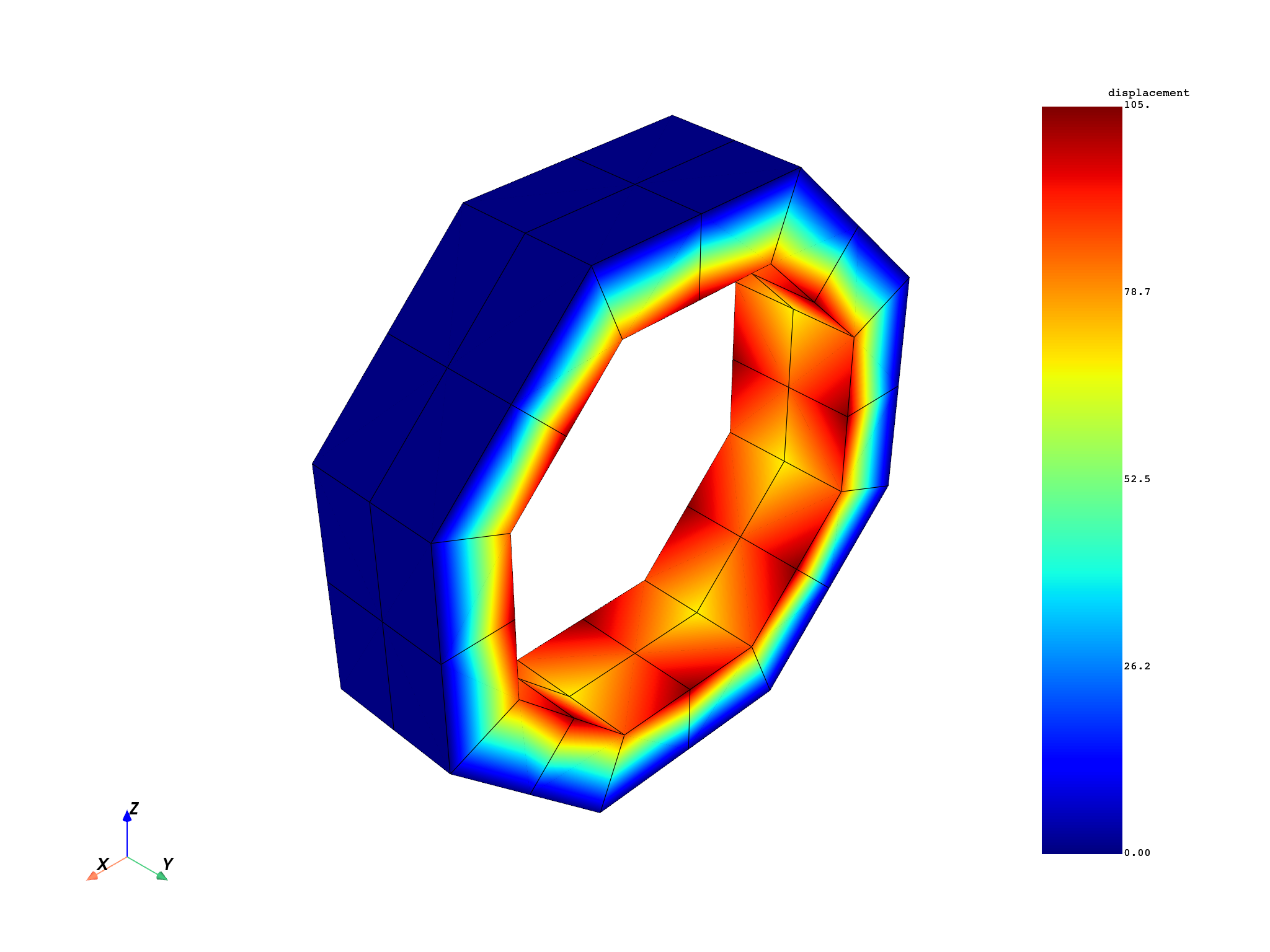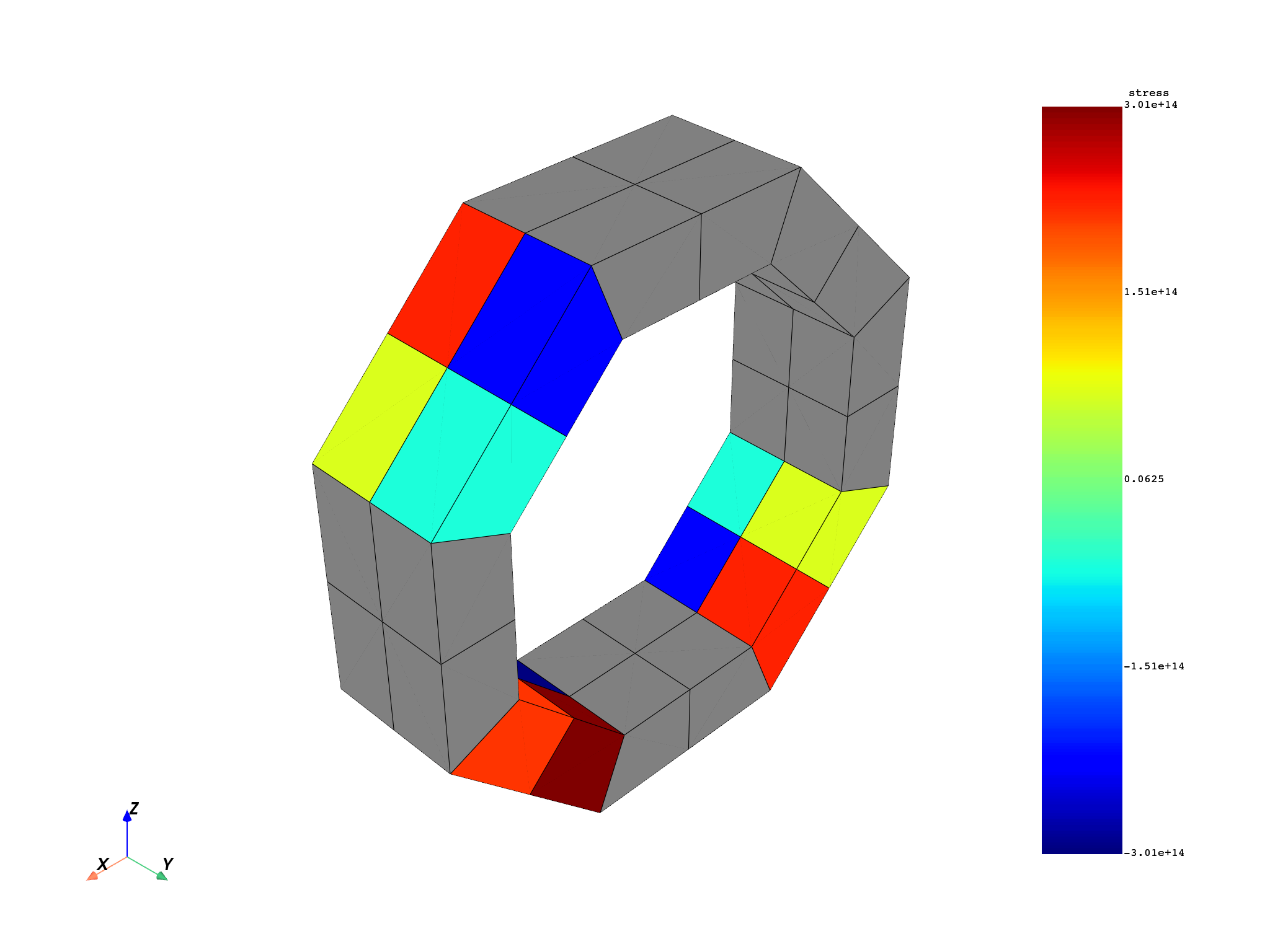Note
Go to the end to download the full example code.
Expand mesh and results for modal cyclic symmetry#
This example shows a modal cyclic symmetry model with mesh and results expansions.
from ansys.dpf import core as dpf
from ansys.dpf.core import examples
Create the model and display the state of the result.
model = dpf.Model(examples.find_simple_cyclic())
print(model)
DPF Model
------------------------------
Modal analysis
Unit system: MKS: m, kg, N, s, V, A, degC
Physics Type: Mechanical
Available results:
- node_orientations: Nodal Node Euler Angles
- displacement: Nodal Displacement
- stress: ElementalNodal Stress
- elemental_volume: Elemental Volume
- stiffness_matrix_energy: Elemental Energy-stiffness matrix
- artificial_hourglass_energy: Elemental Hourglass Energy
- kinetic_energy: Elemental Kinetic Energy
- co_energy: Elemental co-energy
- incremental_energy: Elemental incremental energy
- thermal_dissipation_energy: Elemental thermal dissipation energy
- element_orientations: ElementalNodal Element Euler Angles
- structural_temperature: ElementalNodal Structural temperature
------------------------------
DPF Meshed Region:
51 nodes
4 elements
Unit: m
With solid (3D) elements
------------------------------
DPF Time/Freq Support:
Number of sets: 30
Cumulative Frequency (Hz) LoadStep Substep Harmonic index
1 670386.325235 1 1 0.000000
2 872361.424038 1 2 0.000000
3 1142526.525324 1 3 0.000000
4 1252446.741551 1 4 0.000000
5 1257379.552140 1 5 0.000000
6 1347919.358013 1 6 0.000000
7 679667.393214 2 1 1.000000
8 679667.393214 2 2 -1.000000
9 899321.218481 2 3 -1.000000
10 899321.218481 2 4 1.000000
11 1128387.049511 2 5 1.000000
12 1128387.049511 2 6 -1.000000
13 708505.071361 3 1 -2.000000
14 708505.071361 3 2 2.000000
15 966346.820117 3 3 2.000000
16 966346.820117 3 4 -2.000000
17 1031249.070606 3 5 -2.000000
18 1031249.070606 3 6 2.000000
19 757366.624982 4 1 -3.000000
20 757366.624982 4 2 3.000000
21 926631.623058 4 3 -3.000000
22 926631.623058 4 4 3.000000
23 1035144.649248 4 5 3.000000
24 1035144.649248 4 6 -3.000000
25 807882.379030 5 1 4.000000
26 856868.410638 5 2 4.000000
27 1063247.283632 5 3 4.000000
28 1185511.741334 5 4 4.000000
29 1278969.844256 5 5 4.000000
30 1355579.879820 5 6 4.000000
Expand displacement results#
This example expands displacement results, by default on all
nodes and the first time step. Note that the displacements are expanded using
the read_cyclic
property with 2 as an argument (1 does not perform expansion of the cyclic symmetry).
# Create displacement cyclic operator
u_cyc = model.results.displacement()
u_cyc.inputs.read_cyclic(2)
# expand the displacements
fields = u_cyc.outputs.fields_container()
# # get the expanded mesh
mesh_provider = model.metadata.mesh_provider
mesh_provider.inputs.read_cyclic(2)
mesh = mesh_provider.outputs.mesh()
# plot the expanded result on the expanded mesh
mesh.plot(fields[0])

(None, <pyvista.plotting.plotter.Plotter object at 0x000002A552D7D790>)
Expand stresses at a given time step#
# define stress expansion operator and request stresses at time set = 8
scyc_op = model.results.stress()
scyc_op.inputs.read_cyclic(2)
scyc_op.inputs.time_scoping.connect([8])
# request the results averaged on the nodes
scyc_op.inputs.requested_location.connect(dpf.locations.nodal)
# request equivalent von mises operator and connect it to stress operator
eqv = dpf.operators.invariant.von_mises_eqv_fc(scyc_op)
# expand the results and get stress eqv
fields = eqv.outputs.fields_container()
# plot the expanded result on the expanded mesh
# mesh.plot(fields[0])
Expand stresses at given sectors#
# define stress expansion operator and request stresses at time set = 8
# request the results averaged on the nodes
# request results on sectors 1, 3 and 5
scyc_op = dpf.operators.result.stress(
streams_container=model.metadata.streams_provider,
time_scoping=[8],
requested_location=dpf.locations.nodal,
sectors_to_expand=[1, 3, 5],
read_cyclic=2,
)
# extract Sx (use component selector and select the first component)
comp_sel = dpf.operators.logic.component_selector_fc(scyc_op, 0)
# expand the displacements and get the results
fields = comp_sel.outputs.fields_container()
# plot the expanded result on the expanded mesh
# mesh.plot(fields[0])
Expand stresses and average to elemental location#
# define stress expansion operator and request stresses at time set = 8
scyc_op = dpf.operators.result.stress(
streams_container=model.metadata.streams_provider,
time_scoping=[8],
sectors_to_expand=[1, 3, 5],
bool_rotate_to_global=False,
read_cyclic=2,
)
# request to elemental averaging operator
to_elemental = dpf.operators.averaging.to_elemental_fc(scyc_op)
# extract Sy (use component selector and select the component 1)
comp_sel = dpf.operators.logic.component_selector_fc(to_elemental, 1)
# expand the displacements and get the results
fields = comp_sel.outputs.fields_container()
# # plot the expanded result on the expanded mesh
mesh.plot(fields)

(None, <pyvista.plotting.plotter.Plotter object at 0x000002A54E2074D0>)
Total running time of the script: (0 minutes 5.034 seconds)

